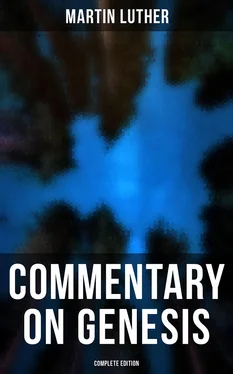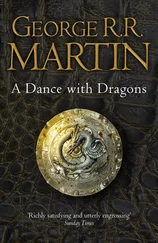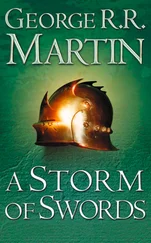Martin Luther - Commentary on Genesis (Complete Edition)
Здесь есть возможность читать онлайн «Martin Luther - Commentary on Genesis (Complete Edition)» — ознакомительный отрывок электронной книги совершенно бесплатно, а после прочтения отрывка купить полную версию. В некоторых случаях можно слушать аудио, скачать через торрент в формате fb2 и присутствует краткое содержание. Жанр: unrecognised, на английском языке. Описание произведения, (предисловие) а так же отзывы посетителей доступны на портале библиотеки ЛибКат.
- Название:Commentary on Genesis (Complete Edition)
- Автор:
- Жанр:
- Год:неизвестен
- ISBN:нет данных
- Рейтинг книги:4 / 5. Голосов: 1
-
Избранное:Добавить в избранное
- Отзывы:
-
Ваша оценка:
- 80
- 1
- 2
- 3
- 4
- 5
Commentary on Genesis (Complete Edition): краткое содержание, описание и аннотация
Предлагаем к чтению аннотацию, описание, краткое содержание или предисловие (зависит от того, что написал сам автор книги «Commentary on Genesis (Complete Edition)»). Если вы не нашли необходимую информацию о книге — напишите в комментариях, мы постараемся отыскать её.
Commentary on Genesis is the last work of Martin Luther, written during the last several years of his life. Luther's work follows the first volume of Psalms with critical and devotional remarks on the creation and on sin and the flood.
Commentary on Genesis (Complete Edition) — читать онлайн ознакомительный отрывок
Ниже представлен текст книги, разбитый по страницам. Система сохранения места последней прочитанной страницы, позволяет с удобством читать онлайн бесплатно книгу «Commentary on Genesis (Complete Edition)», без необходимости каждый раз заново искать на чём Вы остановились. Поставьте закладку, и сможете в любой момент перейти на страницу, на которой закончили чтение.
Интервал:
Закладка:
To reason indeed it seems absurd, that one apple could have such deadly properties or produce such deadly effects as to destroy the whole human race throughout its almost infinite succession; and that too with a death eternal. But this was not the nature or the effect of the apple in itself. Adam did indeed force his teeth into the apple, but his teeth struck in reality upon the sting in the apple, which sting was the prohibition of God, which made his bite to be disobedience to God. This was the real cause of the mighty evil. Adam thus sinned against God, disregarded his commandment and obeyed Satan. The tree of the knowledge of good and evil was in itself "good," the tree which bore the most noble fruits. But as the prohibition of God was attached to it and man disregarded that prohibition, the tree became the deadliest of all poisons.
Just in the same manner as God has said, "Thou shalt not steal," Ex. 20:15, the man who touches the property of another as his own sins against God. So in Egypt when the Jews were commanded of God to ask silver from their neighbors and to carry it away with them; that was no sin; they were justified by the command of God, to whom obedience is due, whatever be the issue or result. So also the suitor when he loves a virgin and has a strong desire of nature to possess her as his wife and marries her, committeth no adultery; though the Law of God forbids coveting and concupiscence. And the great reason is this, matrimony is a divine institution and is a command of God to them who cannot live chastely without marriage. Just the same also is the nature of these two trees. The tree of life gives life, by virtue of the Word which promises and ordains that life. "The tree of the knowledge of good and evil" produces death by virtue of the efficacy of the Word which prohibits the eating of it on the penalty of death in case of disobedience.
This latter tree however is called "the tree of the knowledge of good and evil," Augustine says, because after Adam had sinned by eating of it he not only saw and experienced what good he had lost, but also into what evil and misery he had been hurled by his disobedience. The tree therefore was in itself "good," even as the divine commandment attached to it was "good;" that it should be to Adam a tree of divine worship, by which he should prove his obedience to God, even by an external act of service to him. But by reason of the sin which followed, the same tree became the tree of the curse. Moses now by digressing a little proceeds to give a more extensive description of the original "garden!"
V. 10. And a river went out of Eden to water the garden; and from thence it was parted, and became four heads.
Here again the Latin version is in error, when it makes the proper name, Eden, an appellative. And here Origen and his followers are to be condemned who have recourse in their usual way to allegories. For the things here recorded by Moses as history, are facts. There actually was a great river in Eden, by which the whole garden was watered. That river rising from the east of the garden divided itself into four streams, that no part of the garden might remain unwatered. For, as I have before observed, we are here to have in mind a large space or portion of the earth; because this garden was so constituted that it might be, as to its original design, an appropriate and perpetual habitation for Adam and his whole posterity, which was equally designed to be most extensive.
Vs. 11, 12. The name of one is Pishon; that is it which compasseth the whole land of Havilah, where there is gold; and the gold of that land is good; there is bdellium and the onyx stone.
This is one of the most difficult passages in the writings of Moses, and one which has given rise to the greatest offense in unholy minds. For the real state of the facts recorded, as they are now before our eyes, cannot be denied. The description here given by the sacred historian applies properly to India, which he here calls "Havilah," through which the river Pishon, or the Ganges, flows. The other three rivers Gihon, Hiddekel and Phrath; that is, the Nile, the Tigris and the Euphrates are also well known; and it is equally well known that the Nile and the last two rivers have their sources very distant from each other. The great question therefore that naturally arises is, since the whole world well knows how far distant these rivers are from each other, how can the account of Moses be reconciled with the facts, when he says that all these rivers issued from one fountain; that is, that they flowed from one source in the garden of Eden toward the east? For with respect to the Nile, although its source is unknown, yet the arguments and proofs are plain that it flows from a region in the south. Whereas it is quite certain that the Ganges and the Tigris and the Euphrates flow from the north; sources in the entirely opposite direction.
The account of Moses therefore militates against sense and fact as they now are. This state of things has given occasion to many to form conjectures that Eden was the whole world. Though such conjectures are certainly false, yet they would not of themselves, even if true, reconcile the statements of Moses, nor make all plain when he here says that the source of all these rivers was one and the same. And although it is very probable that if Adam had remained in his innocence and his posterity had greatly multiplied in that state of innocency, God would have enlarged this garden correspondently; yet even that consideration would not justify the supposition that Eden was the whole earth originally; for the sacred text most plainly separates Eden from all the rest of the earth. What shall we say therefore concerning this passage of Moses, contrary as it is to sense and experience, as things now are, and on that account so liable to cause offense being taken; especially since Origen and others have built upon it so many marvelous and absurd fables? Some commentators pretend that there is no difficulty at all nor any liability to offense being taken; and therefore they walk dryshod as it were over this deep sea. Such lack of candor however is also highly unbecoming a commentator.
My opinion on the matter, which indeed I have already given, is that paradise, which was very soon closed against man on account of sin, and afterwards totally destroyed and swept from the earth by the Flood, left not one trace or vestige of its original state remaining, which can now be discovered. I fully believe, as I have before stated, that paradise did exist after the fall of Adam, and that it was known to his posterity; but that it was inaccessible to them on account of the protection of the angel, who as the text informs us guarded Eden with a flaming sword. The awful Deluge however destroyed all things. By which also, as it is written, "All the fountains of the great deep were broken up," Gen. 7:11.
Who can doubt therefore that the fountains of these rivers were also broken up and confounded? As therefore since the Flood mountains exist where fields and fruitful plains before flourished, so there can be no doubt that fountains and sources of rivers are now found where none existed before and where the state of nature had been quite the contrary. For the whole face of nature was changed by that mighty convulsion. Nor do I entertain the least doubt that all those wonders of nature which are from time to time discovered, are the effects and relics of that same awful visitation, the Deluge. In the metallic mines which are now explored are found large logs of wood, hardened into stone; and in masses of stone themselves are perceived various forms of fishes and other animals. With the same confidence I also believe that the Mediterranean sea before the Deluge was not within the land. My persuasion is that the position which it now occupies was formed by the effects of the terrible Flood. So also the space now occupied by the Red Sea was doubtless before a fruitful field, and most probably some portion of this very garden. In like manner, those other large bays, the Gulf of Persia, the gulf of Arabia, etc., as they now exist, are relic effects of the Deluge.
Читать дальшеИнтервал:
Закладка:
Похожие книги на «Commentary on Genesis (Complete Edition)»
Представляем Вашему вниманию похожие книги на «Commentary on Genesis (Complete Edition)» списком для выбора. Мы отобрали схожую по названию и смыслу литературу в надежде предоставить читателям больше вариантов отыскать новые, интересные, ещё непрочитанные произведения.
Обсуждение, отзывы о книге «Commentary on Genesis (Complete Edition)» и просто собственные мнения читателей. Оставьте ваши комментарии, напишите, что Вы думаете о произведении, его смысле или главных героях. Укажите что конкретно понравилось, а что нет, и почему Вы так считаете.












